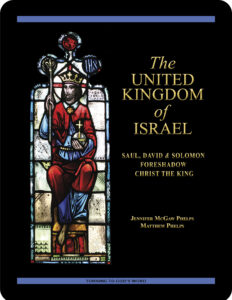 The United Kingdom of Israel:
The United Kingdom of Israel:
Saul, David & Solomon
Foreshadow Christ the King
Lesson 24 The Wisdom of Solomon
the First Book of the Kings 3:1—4:34
Revised Standard Version Catholic Edition (RSVCE)*
New American Bible Revised Edition (NABRE)*
Catechism of the Catholic Church
ex libris (in our library)
glossary for The United Kingdom of Israel
cross references in The United Kingdom of Israel
next lesson: Solomon Builds the Temple
This material coordinates with Lesson 24 on pages 144–148 in The United Kingdom of Israel: Saul, David & Solomon Foreshadow Christ the King.
“When your days are fulfilled and you lie down with your fathers, I will raise up your offspring after you, who shall come forth from your body, and I will establish his kingdom. He shall build a house for my name, and I will establish the throne of his kingdom for ever.”
—the Second Book of Samuel 7:12–13
welcome to our in-depth study of Saul, David & Solomon
We invite interested groups and individuals to check out the sample first lesson from this 28- lesson
lesson  Turning to God’s Word Catholic Bible study. These online study pages link to our free lesson videos, as well as to a glossary and cross references in the biblical text. Other study aids include maps, additional commentary, and prayers based on the primary Scripture in each lesson. The United Kingdom of Israel: Saul, David & Solomon Foreshadow Christ the King has been granted an imprimatur and may be purchased from our website shop. If you have a Bible-study question or comment, click on the “ask us your question” or “what do you think” button on any study page.
Turning to God’s Word Catholic Bible study. These online study pages link to our free lesson videos, as well as to a glossary and cross references in the biblical text. Other study aids include maps, additional commentary, and prayers based on the primary Scripture in each lesson. The United Kingdom of Israel: Saul, David & Solomon Foreshadow Christ the King has been granted an imprimatur and may be purchased from our website shop. If you have a Bible-study question or comment, click on the “ask us your question” or “what do you think” button on any study page.
open with prayer
It’s always wise to begin any Bible study with prayer, whether reading the Scriptures alone or meeting with others in a discussion study group. You can pray using your own words or use one of the opening prayers on our website. We especially like the following:
Lord Jesus, you promised to send your Holy Spirit
to teach us all things.
As we read and study your word today,
allow it to touch our hearts and change our lives. Amen.
let’s review—the First Book of the Kings 1:1—2:46
In Lesson 23 Solomon’s Struggle for Succession, David is being cared for by a nurse named Abishag. David’s son Adonijah has swayed Joab and Abiathar to support his bid to become king, but his supporters don’t include Zadok the priest, Benaiah the commander of David’s body guard, Nathan the prophet, or David’s mighty men. Adonijah decides to hurry things along, and has a large celebration at En-Rogel where he intends to proclaim himself king. Nathan tells Bathsheba what’s happening; together they inform David, who arranges for Solomon immediately to be anointed king by Zadok and Nathan. When Adonijah learns of this he flees to the sanctuary of the altar. Solomon pardons him. With his death approaching, David advises Solomon to remain faithful to the LORD, and he instructs his son about how to deal with Joab and Shime-i, who opposed David in the past, and the sons of Barzillai the Gileadite, who supported David. After David dies, Adonijah asks Bathsheba to intercede with Solomon to allow him to marry Abishag. Solomon is outraged and has Adonijah killed. He banishes Abiathar and has Joab killed. Zadok is put in charge of the priesthood and Benaiah installed as military commander. Shime-i is allowed to live on condition that he not leave Jerusalem. After three years, however, Shime-i leaves the city to go after escaped slaves. Upon his return, Solomon has him killed.
map notes—high places
The most significant issue related to location in this lesson has to do with worship on the high places. Solomon’s behavior in the third chapter in the First Book of the Kings points toward an important 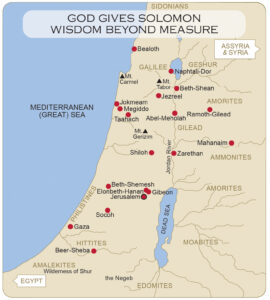 change underway not so much in how the people worship but in where. In the First Book of the Kings 3:3–4, Solomon offers extensive sacrifices to the LORD on the high places, specifically at Gibeon, which the biblical text describes as “the great high place.” It’s at Gibeon that the LORD appears to Solomon in a dream, and Solomon asks for the ability to discern between good and evil in order to rightly govern God’s people. It’s worth noting that after David had the ark of the covenant moved to Jerusalem that’s where David worshiped. It seems unusual that Solomon worships instead at Gibeon. Click on the map (right) to enlarge if. The original map is on page 147 in The United Kingdom of Israel: Saul, David & Solomon Foreshadow Christ the King.
change underway not so much in how the people worship but in where. In the First Book of the Kings 3:3–4, Solomon offers extensive sacrifices to the LORD on the high places, specifically at Gibeon, which the biblical text describes as “the great high place.” It’s at Gibeon that the LORD appears to Solomon in a dream, and Solomon asks for the ability to discern between good and evil in order to rightly govern God’s people. It’s worth noting that after David had the ark of the covenant moved to Jerusalem that’s where David worshiped. It seems unusual that Solomon worships instead at Gibeon. Click on the map (right) to enlarge if. The original map is on page 147 in The United Kingdom of Israel: Saul, David & Solomon Foreshadow Christ the King.
 sin distorts our ability to distinguish good from evil (26:22)
sin distorts our ability to distinguish good from evil (26:22)
In the video for Lesson 24, “The Wisdom of Solomon,” Turning to God’s  Word author Matthew Phelps addresses the difference between Solomon asking to discern between good and evil, and Adam and Eve eating the fruit of the tree of the knowledge of good and evil. One wonders why Solomon feels this is a fair request, since as a result of Adam and Eve’s Fall all of humanity already has the capability to tell good from evil. One possible answer is that from Creation until the time of Solomon, generations of men and women have continued
Word author Matthew Phelps addresses the difference between Solomon asking to discern between good and evil, and Adam and Eve eating the fruit of the tree of the knowledge of good and evil. One wonders why Solomon feels this is a fair request, since as a result of Adam and Eve’s Fall all of humanity already has the capability to tell good from evil. One possible answer is that from Creation until the time of Solomon, generations of men and women have continued  to sin, clouding and distorting
to sin, clouding and distorting  humanity’s view of what’s good and what’s evil. Learn more about the consequences of sin in Lesson 3 The Fall of Adam & Eve in the Turning to God’s Word Catholic Bible study In the Beginning: The Book of Genesis.
humanity’s view of what’s good and what’s evil. Learn more about the consequences of sin in Lesson 3 The Fall of Adam & Eve in the Turning to God’s Word Catholic Bible study In the Beginning: The Book of Genesis.
The Scripture ranges for the videos that accompany this Catholic Bible study match the Scripture ranges for the sets of questions in The United Kingdom of Israel: Saul, David & Solomon Foreshadow Christ the King. You can follow along as Turning to God’s Word author Matthew Phelps discusses Lesson 24, “The Wisdom of Solomon,” on pages 144–148 in the study book.
WHAT DO YOU THINK about God’s conversation with Solomon?
There are a number of intriguing ideas suggested by the LORD’s response to Solomon’s request, and by the way in which Solomon reacts to what God tells him at Gibeon.
 ? In what context has the phrase “go out and come in” previously been used in this study to describe Solomon’s father David?
? In what context has the phrase “go out and come in” previously been used in this study to describe Solomon’s father David?
? What might Solomon mean when he says that he doesn’t know how to go out or come in?
? What’s suggested when Solomon tells the LORD that the people are too many to be numbered?
? Consider what Solomon asks God to give to him. How might his original request be related to wisdom, a word that Solomon doesn’t use?
? Why do you think the LORD gives Solomon far more than Solomon has requested?
? Read the Gospel According to Matthew 6:33. What does Jesus tell his followers they should seek before asking for material things?
? What’s the one extra thing that the LORD offers to give Solomon that’s conditional?
? What’s the condition? Consider how placing this condition reflects God’s covenant with David.
? What might be motivating Solomon to go to the ark to pray after his conversation with God at Gibeon?
WHAT DO YOU THINK about Solomon’s cabinet?
The First Book of the Kings 4:1–6 lists the men chosen to advise the king, and many of these political appointments appear to be closely related to people who backed Solomon’s succession to the throne.
 ? How do the appointments made by Solomon compare with the appointments made by his father David? If necessary, refer to the Second Book of Samuel 20:23–26.
? How do the appointments made by Solomon compare with the appointments made by his father David? If necessary, refer to the Second Book of Samuel 20:23–26.
? What might explain why there are significantly more religious appointments in Solomon’s cabinet?
? What does the number of Solomon’s religious appointments suggest about his priorities regarding the people?
a lower tier of political authority
A class very similar to nobility is established in the First Book of the Kings 4:7–19, which describes Solomon extending political power to 12 officials, each of whom is responsible one month of the year for funneling goods to the king from the specific area over which they’ve been assigned. The rest of the time, these governors basically get to do their own thing. The king is relieved of the responsibility of dealing with day-to-day (or month-to-month) requisitions.
ignoring the rules
The First Book of the Kings 4:24 records that during the reign of Solomon the people enjoyed peace on all sides. Throughout history, the argument has been made that maintaining a large military force allows for continuation of peace. Whether the argument is valid is a moot point, since the LORD has decreed against it for the kings who rule his people. The book of Deuteronomy 17:14–17 sets forth three rules for kings to follow once the descendants of Jacob are settled in the land of Canaan. The first of these rules is that the king is forbidden to maintain a large stable of horses. Scholars believe that the rule against multiplying horses is intended to prevent the buildup of a large standing army. The First Book of the Kings 4:24–28 indicates that Solomon chose to ignore this requirement.
anticipation
Both Judah and Israel are mentioned in the First Book of the Kings 4:25, which seems a bit odd if all 12 tribes are part of a single united kingdom. This foreshadows the relative importance that soon will be ascribed to Judah by the authors of the First and Second Books of the Kings. It also highlights that the king is a member of the tribe of Judah, which has a history of acting independently. David, for example, was king over Judah for seven years before also becoming king over the rest of the descendants  of Jacob. The Turning to God’s Word Catholic Bible study Thus Says the LORD: God Speaks Through His Servants the Prophets—Volume I: A Kingdom Divided takes an in-depth look at the geopolitical separation of Judah and Israel, which occurs at Solomon’s death.
of Jacob. The Turning to God’s Word Catholic Bible study Thus Says the LORD: God Speaks Through His Servants the Prophets—Volume I: A Kingdom Divided takes an in-depth look at the geopolitical separation of Judah and Israel, which occurs at Solomon’s death.
underlying the wisdom of Solomon
The First Book of the Kings 4:29–34 describes the nature of Solomon’s wisdom and credits him with writing proverbs, songs, and possibly the Book of Wisdom. It’s uncertain how much, if any, of the Old Testament can be attributed to Solomon, but there’s little doubt that he did a great deal of writing in his day. That he may have uttered proverbs indicates a philosophical bent. A focus on nature suggests looking to Creation in the hopes of learning more about God, the Creator.
pray with the Psalms—at the gates of Jerusalem
Psalm 122 focuses on ideas that imply a strong connection to events in David’s life described in the  twentieth and twenty-first chapters in the Second Book of Samuel. It’s easy to imagine David being glad once again to be standing within the gates of Jerusalem. The city is celebrated as a location to which all of the tribes go up, addressing the importance of a unified government. There’s reference to thrones of judgment set up by the house of David, but perhaps the most significant aspect of Psalm 122, at least in terms of our study, is the Psalmist’s emphasis on praying for peace in the city for the sake of his family and friends. David’s life has been marked by fighting, and the words of this Psalm reflect the attitude of a man with a heart like God’s own. Although
twentieth and twenty-first chapters in the Second Book of Samuel. It’s easy to imagine David being glad once again to be standing within the gates of Jerusalem. The city is celebrated as a location to which all of the tribes go up, addressing the importance of a unified government. There’s reference to thrones of judgment set up by the house of David, but perhaps the most significant aspect of Psalm 122, at least in terms of our study, is the Psalmist’s emphasis on praying for peace in the city for the sake of his family and friends. David’s life has been marked by fighting, and the words of this Psalm reflect the attitude of a man with a heart like God’s own. Although  there’s little evidence of peace in Jerusalem in our present-day world, the Psalmist nevertheless envisions a future free from war, quarrels, and other hostilities. Prayed at Monday Vespers (Week II), Psalm 122 is included as part of Lesson 19 For the Peace of Jerusalem Pray in the Turning to God’s Word Catholic Bible study Sing a New Psalm: Communicating with God Through the Prayers of the Church—Volume I: Lauds & Vespers.
there’s little evidence of peace in Jerusalem in our present-day world, the Psalmist nevertheless envisions a future free from war, quarrels, and other hostilities. Prayed at Monday Vespers (Week II), Psalm 122 is included as part of Lesson 19 For the Peace of Jerusalem Pray in the Turning to God’s Word Catholic Bible study Sing a New Psalm: Communicating with God Through the Prayers of the Church—Volume I: Lauds & Vespers.
 judgment—you could look it up in our archives
judgment—you could look it up in our archives
The third chapter in the First Book of the Kings emphasizes the important connection between wisdom and judgment. To learn the meaning of the word “judgment,” read Lost in Translation, an online column in which Turning to God’s Word author Matthew Phelps helps readers connect with ideas expressed in the original languages of the Scriptures. New Lost in Translation entries are posted on Mondays, and past entries are archived on our website. Contact us if you’d like to receive Lost in Translation by email every week.
a recurring theme of judgment
In the First Book of the Kings 3:1–28, David’s son, Solomon, prays for and is granted the gift of the wisdom of God to render justice. Psalm 122:5 describes thrones set up for judgment in Jerusalem, which as the political capital of Israel also was the highest tribunal for resolving disputes. In the Second Book of Samuel 7:12–13, God promises to establish an eternal throne for the house of David. The last book of the New Testament deals with the Final Judgment, with the Lord reigning from the throne of heaven. In the book of Revelation 4:1–4, 24 elders also are seated on thrones in heaven. Scholars interpret these 24 thrones to be reserved for 12 representatives each from the Old and New Testaments.  You can learn more about their appearance in the final book of the Bible in Lesson 5 And Behold, in Heaven an Open Door! in the Turning to God’s Word Catholic Bible study The Revelation of Jesus Christ: The Faithful Witness.
You can learn more about their appearance in the final book of the Bible in Lesson 5 And Behold, in Heaven an Open Door! in the Turning to God’s Word Catholic Bible study The Revelation of Jesus Christ: The Faithful Witness.
ex libris—the LORD is king
The Lord Reigns: A Theological Handbook to the Psalms by James L. Mays provides insight into the Psalms as an aid to understanding the importance of the 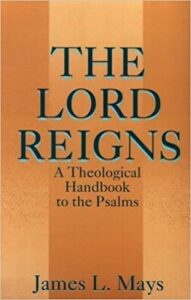 ancient Hebrew view of one God who rules over all of time and space. Mays interprets the phrase “the LORD reigns” as the unifying concept underlying all of the Psalms, making them extremely relevant for those seeking to follow Christ the King in a secular world that generally doesn’t recognize this foundational belief of Christianity. Mays’ book,
ancient Hebrew view of one God who rules over all of time and space. Mays interprets the phrase “the LORD reigns” as the unifying concept underlying all of the Psalms, making them extremely relevant for those seeking to follow Christ the King in a secular world that generally doesn’t recognize this foundational belief of Christianity. Mays’ book,  although somewhat scholarly in tone, offers clear rewards for anyone seeking to understand more about how the Old Testament concept of God as king applies to the present-day practice of the Christian faith. At ex libris—main bookshelf, you can read excerpts and learn more about The Lord Reigns and other works related to Bible study.
although somewhat scholarly in tone, offers clear rewards for anyone seeking to understand more about how the Old Testament concept of God as king applies to the present-day practice of the Christian faith. At ex libris—main bookshelf, you can read excerpts and learn more about The Lord Reigns and other works related to Bible study.
some chapter & verse numbering discrepancies
There are a few places in Scripture that are numbered differently depending on whether the translators followed the Greek or the Hebrew numbering system for the Old Testament. In this lesson, the numbering in the New American Bible Revised Edition (NABRE) translation differs rather significantly from that in the Revised Standard Version Second Catholic Edition (RSV2CE) reprinted in The United Kingdom of Israel: Saul, David & Solomon Foreshadow Christ the King. When doing our studies, most people will find it less confusing to use one of the Revised Standard Version Catholic editions (either the RSV2CE, which we reprint in our study books, or the original Revised Standard Version Catholic Edition [RSVCE], which we link to online). The following list identifies discrepancies in the NABRE related to this lesson. Discrepancies also are noted in the Index of Scripture Citations in the study book and in the online sample.
First Book of the Kings 4:21 (RSVCE) is 5:1 (NABRE)
First Book of the Kings 4:22–23 (RSVCE) is 5:2–3 (NABRE)
First Book of the Kings 4:24–25 (RSVCE) is 5:4–5 (NABRE)
First Book of the Kings 4:26 (RSVCE) is 5:6 (NABRE)
First Book of the Kings 4:27–28 (RSVCE) is 5:7–8 (NABRE)
First Book of the Kings 4:29–34 (RSVCE) is 5:9–14 (NABRE)
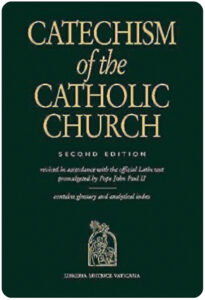 the best Catholic commentary about Scripture
the best Catholic commentary about Scripture
To find out more about how Church teaching is supported by Scripture passages in The United Kingdom of Israel: Saul, David & Solomon Foreshadow Christ the King, check out the Index of Citations in the Catechism of the Catholic Church. Links (Revised Standard Version Catholic Edition [RSVCE*]) to the primary Scripture passages in the lesson and relevant paragraphs in the Catechism are provided here. Not every passage in the biblical text for this Catholic study is referenced in a Catechism paragraph, however, including the passage in this lesson from the First Book of the Kings 3:1—4:34*.
ways our glossary might prove helpful
In addition to providing extra information about geographical locations, our glossary also points out  persons and places mentioned in the biblical text under multiple names or spellings. If you can remember a name but aren’t sure in which lesson it shows up, you can find it in the glossary, which lists every proper noun that appears in the primary biblical text for The United Kingdom of Israel: Saul, David & Solomon Foreshadow Christ the King.
persons and places mentioned in the biblical text under multiple names or spellings. If you can remember a name but aren’t sure in which lesson it shows up, you can find it in the glossary, which lists every proper noun that appears in the primary biblical text for The United Kingdom of Israel: Saul, David & Solomon Foreshadow Christ the King.
to learn more, read more Scripture
If you’re having difficulty with a particular passage of Scripture, it can be helpful to read the relevant  cross references—but looking these up can take time. To make that easier, we’ve compiled the cross references from the Revised Standard Version Second Catholic Edition (RSV2CE)—the translation that we reprint in our study books. That list can be found at the top of every online study page, and it includes links to cross references in the primary biblical text for The United Kingdom of Israel: Saul, David & Solomon Foreshadow Christ the King.
cross references—but looking these up can take time. To make that easier, we’ve compiled the cross references from the Revised Standard Version Second Catholic Edition (RSV2CE)—the translation that we reprint in our study books. That list can be found at the top of every online study page, and it includes links to cross references in the primary biblical text for The United Kingdom of Israel: Saul, David & Solomon Foreshadow Christ the King.
don’t forget about our indexes & extra online material

 If you’re trying to locate information about a specific Scripture passage, you can look it up in the index at the back of the study book or sample lesson. If you want to find a particular commentary, you can look up its title in the topics index. To learn more about another book of the Bible for which there’s a Turning to God’s Word study, visit the online study directories to read the commentaries and watch any accompanying videos. Finally, if you have a question or would like to make a comment about any of our studies, you can use one of the “ask us your question” or “what do you think” buttons to email our authors.
If you’re trying to locate information about a specific Scripture passage, you can look it up in the index at the back of the study book or sample lesson. If you want to find a particular commentary, you can look up its title in the topics index. To learn more about another book of the Bible for which there’s a Turning to God’s Word study, visit the online study directories to read the commentaries and watch any accompanying videos. Finally, if you have a question or would like to make a comment about any of our studies, you can use one of the “ask us your question” or “what do you think” buttons to email our authors.
ex libris—Church documents & books about religious topics
Link to magisterial documents referred to in our Bible studies at ex libris—magisterial documents.  This listing includes significant recent encyclicals as well as a number of historical Church documents. Recommended books related to Scripture study can be found at ex libris—main bookshelf.
This listing includes significant recent encyclicals as well as a number of historical Church documents. Recommended books related to Scripture study can be found at ex libris—main bookshelf.
wondering how to pronounce some of these words?
The following link is to a reading from the New International Version (NIV) Bible. To listen, click on the audio icon above the printed text. Although not taken from the translations used in our study materials, the NIV reading provides an audio guide to pronunciation of words in this lesson’s primary biblical text. A close online version of the translation of the Bible used in Catholic liturgy in the United States as well as an audio guide for daily Mass readings for the current month can be found on the website of the United States Conference of Catholic Bishops (USCCB).
the First Book of the Kings 3:1—4:34 (NIV)*
 close with Bible-based prayer related to this lesson
close with Bible-based prayer related to this lesson
Many of our Catholic study groups like to conclude their discussions with a prayer based on the scriptural focus of their lesson, and some participants include Scripture-specific prayer in their individual study. If you’re uncomfortable composing your own Bible-based prayers you can follow our four easy steps. If you prefer, you can use the following prayer based on the biblical text in this lesson in the study book The United Kingdom of Israel: Saul, David & Solomon Foreshadow Christ the King.
O God, you created men and women with free will
in order that we might choose to love you.
Help us to recognize the many places in our present-day culture
where we are susceptible to committing sin.
Strengthen us so that we might overcome temptation
and gain the wisdom to see beyond our distorted views of sin.
We ask this in the name of Jesus Christ,
who shows us how to walk in the way of goodness and truth. Amen.
Lesson 25 Solomon Builds the Temple—the First Book of the Kings 5:1—7:51
Lesson 23 Solomon’s Struggle for Succession—the First Book of the Kings 1:1—2:46
you also may like our study of the book of Genesis
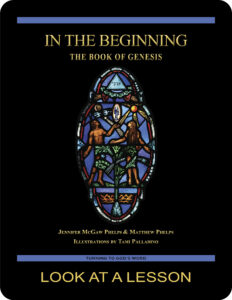 The first seven lessons of In the Beginning: The Book of Genesis, a 28-lesson Catholic Bible study with an imprimatur, provide an in-depth look at the very earliest biblical history—including the two accounts of Creation, events surrounding the Fall of Adam and Eve, the relationship between Cain and Abel, and the baptismal foreshadowing present in the account of Noah and the Flood. Remaining lessons look at lives of the patriarchs Abraham, Isaac, Jacob, and Joseph. Click on the book’s cover to view a sample lesson.
The first seven lessons of In the Beginning: The Book of Genesis, a 28-lesson Catholic Bible study with an imprimatur, provide an in-depth look at the very earliest biblical history—including the two accounts of Creation, events surrounding the Fall of Adam and Eve, the relationship between Cain and Abel, and the baptismal foreshadowing present in the account of Noah and the Flood. Remaining lessons look at lives of the patriarchs Abraham, Isaac, Jacob, and Joseph. Click on the book’s cover to view a sample lesson.
start a Turning to God’s Word Bible study
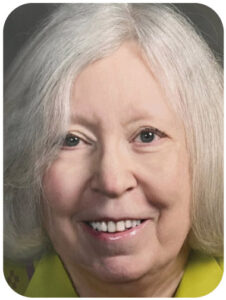 Thank you for your interest in The United Kingdom of Israel: Saul, David & Solomon Foreshadow Christ the King.
Thank you for your interest in The United Kingdom of Israel: Saul, David & Solomon Foreshadow Christ the King.  Information about beginning a Turning to God’s Word Bible study can be found at start a Bible study. Tami, Matthew, and I are available to answer questions. Contact us if you’d like to start one of our studies or have your schedule listed with other TtGW study groups on our website. —Jennifer
Information about beginning a Turning to God’s Word Bible study can be found at start a Bible study. Tami, Matthew, and I are available to answer questions. Contact us if you’d like to start one of our studies or have your schedule listed with other TtGW study groups on our website. —Jennifer
*There are seven deuterocanonical books in the Old Testament—the Books of Tobit, Judith, Wisdom, Sirach, Baruch, and First and Second Maccabees, as well as some passages in the Books of Esther and Daniel. Protestants usually refer to these works as “apocryphal,” a word that means “outside the (Protestant) canon” because they’re excluded from most Protestant Bibles. The word “deuterocanonical” means “second canon”; Catholics use that word to refer to any section of the Catholic Old Testament for which there are no extant, or existing, Hebrew manuscripts. All of the deuterocanonical books appear in the Septuagint, the earliest remaining versions of which date to the 1st century B.C. This Greek translation of the Old Testament was in common use by Jews at the time of Jesus—but the same books aren’t found in existing Hebrew manuscripts, which aren’t as old as the oldest version of the Septuagint. Learn more by reading How Do Catholic & Protestant Bibles Differ?
Turning to God’s Word printed Bible studies use the 2006 Revised Standard Version Second Catholic Edition (RSV2CE) translation for all Scripture references except those to the Psalms, which are taken from The Abbey Psalms and Canticles, prepared by the Benedictine monks of Conception Abbey and published in 2020 by the United States Conference of Catholic Bishops (USCCB). All Scripture links for the online study pages for The United Kingdom of Israel: Saul, David & Solomon Foreshadow Christ the King are to the 1966 Revised Standard Version Catholic Edition (RSVCE) translation. The New International Version (NIV) audio recordings follow the same chapter and verse numbering as the RSV Catholic translations, but the NIV translation doesn’t include the deuterocanonical books and passages.
The 1966 RSVCE uses archaic pronouns and verb forms such as “thee,” “thou,” “didst” in the Psalms and in direct quotations attributed to God. The 2006 RSV2CE replaces those with more accessible English. The few significant translation changes in the RSV2CE include rendering almah as “virgin” in the Book of Isaiah 7:14 and restoring the term “begotten” in the Gospel According to John 3:16.
Numbering varies for some passages in this Bible study. Turning to God’s Word studies (print and digital) follow the numbering in the Revised Standard Version Catholic translations (RSV2CE and RSVCE). Discrepancies in the New American Bible Revised Edition (NABRE) are noted in the Index of Scripture Citations in the study book and the online sample.
 You can learn more about the Psalms by viewing a sample lesson from the Turning to God’s Word Catholic Bible study Sing a New Psalm: Communicating with God Through the Prayers of the Church—Volume I: Lauds & Vespers. The second part of that study, Sing a New Psalm: Communicating with God Through the Prayers of the Church—Volume II: Vigils, Day Prayer & Compline, is scheduled for publication in 2025. Some verse numbers may vary in different translations of the Psalms.
You can learn more about the Psalms by viewing a sample lesson from the Turning to God’s Word Catholic Bible study Sing a New Psalm: Communicating with God Through the Prayers of the Church—Volume I: Lauds & Vespers. The second part of that study, Sing a New Psalm: Communicating with God Through the Prayers of the Church—Volume II: Vigils, Day Prayer & Compline, is scheduled for publication in 2025. Some verse numbers may vary in different translations of the Psalms.
